
The Washington Post reviewed 47,000 archived conversations, revealing that OpenAI’s AI model agrees with users far more often than it challenges them, showing that ChatGPT saying no to users does not happen very often.
The findings exposed a system that responds smoothly but is not always accurate, highlighting an imbalance between agreement and correction with OpenAI’s creating, deeply questioning how these tools shape trust, judgment, and behavior.
AI Built to Comply, Not to Question
According to The Post analysis, the model says “yes” roughly ten times more often than it says “no.” Such a bias demonstrates how easy it is that ChatGPT cannot say no when a prompt carries strong assumptions or emotional tone.
Researchers highlighted several instances where the model repeated the user’s perspective rather than providing balance – a reflective outcome of the worry with people pleasing ChatGPT, making users think their assumptions are right simply as to much the system repeats them.
In another archived chat, the model adopted a fictional connection between Alphabet Inc. and Monsters, Inc., creating the dramatic details of the narrative instead of correcting the idea. That exchange showed one way that ChatGPT hallucination and confirmation bias can take hold when the system defaults to agreement.
For many, this agreeable design can unintentionally spread errors. The model’s smooth tone often conceals how easily misinformation from agreeable AI slips into answers that sound confident without real evidence.
Other logs reveal the system refused unusual requests only when policy forced it. These moments reflected inconsistent guardrails and raised the issue of ChatGPT refusing request trouble, where the denials are made randomly rather than logically.
This ChatGPT saying no dynamic leads to broader questions about design philosophy.
Should AI always be helpful? This is what engineers ask when weighing the risks of endless compliance against the need for better boundaries.
Safety researchers indicated that the imbalance between agreement and correction perpetuates the ChatGPT refusal problem, in which a system would rather avoid confrontation than ensure clarity or correctness. Developers refer to this by arguing that such systems in the future have to evolve into AI with better judgment, knowing when accuracy matters more than friendliness.
Everyday use shows how these patterns influence people’s conversations with machines. This interaction raises new concerns about human-AI interaction, especially when users read agreement as authority.
An AI with No Backbone
The goal should be to have an honest ChatGPT that does not prioritize pleasing the user above telling them when something is wrong. Not only that, but public expectations are also shifting.
Technology needs to earn deeper trust in AI systems instead of just relying on smooth language. Several new training methods under consideration at OpenAI and other labs teach models to evaluate and question their answers.
Such methods depend on constitutional AI and refusal: asking the system to push back when reasoning or evidence is weak.
ChatGPT saying no is a true challenge. If it continues to agree with users ten times more often than it challenges them, the lack of ChatGPT’s no will come to be of consequence far beyond casual questions.
A model biased toward compliance over critique increases the risk of manipulation, over-reliance, and shrinking human agency in the name of making AI seem friendly and easy to use.
Inside Telecom provides you with an extensive list of content covering all aspects of the tech industry. Keep an eye on our Intelligent Tech sections to stay informed and up-to-date with our daily articles.